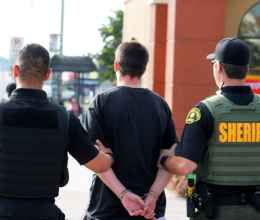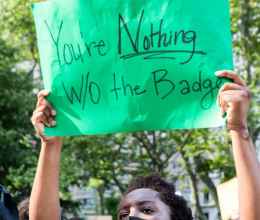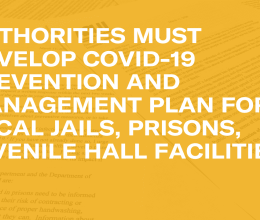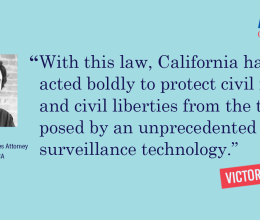SACRAMENTO—Today, the California Senate approved SB 10, a bill to reform and modernize California’s money bail system, on a bipartisan 25-11 vote. The bill was introduced by Senator Hertzberg (D-Van Nuys) in partnership with Assemblymember Bonta (D-Oakland), who also introduced identical bail reform legislation, AB 42. Together, SB 10 and AB 42 comprise The California Money Bail Reform Act. The Assembly is expected to take AB 42 up for a floor vote later this week.
SB 10 and AB 42 will help ensure California jails do not hold people pretrial simply because they cannot afford bail. The bills instead prioritize services to help people make their court appearances, curbing the state’s over reliance on money bail and mass incarceration. The legislation builds upon common-sense solutions adopted in other localities that have significantly reduced their use of commercial bail, such as Kentucky, New Jersey and Santa Clara, California.
“Money bail represents one of the largest barriers to fair and equitable treatment for California families and communities in our justice system, especially for low-income communities of color,” said Jessica Bartholow, Policy Advocate with the Western Center on Law and Poverty. “The California Money Bail Reform Act is a beacon of hope for people who cannot afford equal justice today”
Every year, California jails thousands of low-income people who have not been convicted simply because they cannot afford to post bail. Over 60 percent of people in California jails are there awaiting trial or sentencing, costing taxpayers $5 million a day. Many of them remain in jail for weeks, months, and sometimes years while their cases move forward -- or plead guilty to a crime they may not have committed in order to be released sooner, return to their families, and avoid being subjected to violence and poor conditions in California jails. Detaining people in jail while their cases move forward can have significant and long-lasting impacts on the outcome of people’s cases, as well as their health, wellbeing, and economic security.
"The pain, hardship, stress and emotional toll my family went through was one of the worst experiences of my life,” said Ato Walker, Community Organizer with Silicon Valley De-Bug, who was arrested and had bail set to $85,000. His mother signed a contract with a for-profit bail agency to get him released while he fought the charges. Soon after he was arrested, the charges were dropped, but the $8,500 his mother paid the bail agency were gone for good. Typically, for profit bail agencies charge a non-refundable 10 percent fee based on someone’s total bail amount. However, defendants and their families are on the hook to pay that money regardless of whether a court finds someone innocent or whether the District Attorney drops the charges against them.
Meanwhile, wealthy defendants are able to post bail and buy their freedom with ease. Moreover, because Black and Latino people are more likely to be jailed than white people while their cases move forward, money bail systems fuel already egregious racial disparities in the justice system. Research shows that Black people and Latinos are assigned 35 percent and 19 percent higher bail amounts, respectively, than white people accused of similar offenses.
“Relying on individual wealth, rather than risk to public safety to determine who can be released while they await trial does little to promote safety in our communities,” said John Bauters, Director of Government Relations with Californians for Safety and Justice. “The California Money Bail Reform Act will help ensure California prioritizes community safety and wellbeing over individual wealth.”
State lawmakers carefully designed SB 10 and AB 42 in large part based on the successes of other jurisdictions to reform California’s pretrial system. Kentucky, for example, releases about 70 percent of people awaiting the resolution of their cases; 90 percent of them make all their future court appearances and 92 percent stay arrest-free while they wait for their cases to go forward. In contrast, in California under our current system, the rate at which people return to court after release is lower than in the rest of the country.
The California Money Bail Reform Act is sponsored by the American Civil Liberties Union of California, the Anti-Recidivism Coalition, Californians for Safety and Justice, the Ella Baker Center for Human Rights, Essie Justice Group, the California Public Defenders Association, Silicon Valley De-Bug, SEIU California, and the Western Center on Law and Poverty.
###








